|
Training and Learning After completing Jim Thorpe Marathon in April, I coordinated what I called my "Mountain Training Camp." This was really just a long weekend spent over 8000 ft altitude, breathing thin air, hiking steep hills to 10000+ ft, going for short runs, (downhill mountain biking for Sid and Dave), and ending with the Aspen Valley Marathon. We weren’t going out to Colorado to sit around We were in a glorious mountain town (Snowmass) and we were going to enjoy it. Since Aspen wasn't a goal race, it was a "check-in" marathon and it was also our race to test race nutrition and hydration plans, make mistakes, learn, but also to just take it all in. Just being present and existing at altitude is training. All we needed to do this weekend was breathe. Missed Last Long Run. Not good for my confidence. Dave and I missed our last long run due to thunderstorms interfering and schedules being too full to find another day. I didn't feel great about that. This put our last long run one month out from Aspen. I prefer 2 weeks for a taper, not 4. My confidence took a hit because it was such a long time since I ran for 3+ hours. But this marathon was going to happen regardless of what did or didn't happened two weeks ago. Check in 5k's and goal setting. At the end of June and early July. we raced two check-in 5ks in hot/humid/summer heat. Dave and I ran both ran about 6:49 pace for these two races, I had our potential for Aspen projected out to a 3:35-3:30. I felt that was fair. Fuel Testing. Important: I am testing strategies for me, not claiming that what I am doing is the best way, the right way, the only way to fuel. If you want to personalize your nutrition strategies, please know I offer this service as a nutrition coach. My rates are affordable and I would love to help you find your best way. In this blog, I share what I am testing. What I do for me is not going to also be right for you. After I felt wonky at the end of Jim Thorpe, I revised my fueling strategy. I have been on a mission to see what I can do if I follow the science more closely than I have before. By Aspen, I was ready to test out my practiced fueling plan in a marathon. Despite the wide range of random "advice" offered on the interest, the nutrition research is pretty clear about the general recommendations for endurance athletes. Personalizing these recommendations it what takes works. As someone with a MS degree in exercise science, I like to start with literature reviews of the science and then make needs-based adjustment from there. I don't need to reinvent the wheel. What does the science say? 60 grams of carbs per hour is the target for endurance training over 2.5 hours. 30 grams/hr is deemed adequate for less than 2.5 hour. Up to 90 grams/hour is the target for longer and/or high intensity runs. Elite marathoners are reported to do well in this volume of fuel after but it takes time to train their gut handle this concentration of fuel. Usually I plan nutrition based on weight. But since the window is quite large here (30g-90g of carbs per hour) I am testing out 60g per hour to see how I feel. (I may do well with less than 60 gram/hour since I am a smaller person. Dave may need more since he is 50% larger than me. We have to test to find out.) To calculate carbs per hour, I am counting everything I eat from pre-race through the finish line as "Race Fuel" and aiming to consume enough carbs from the moment I wake up until the time the race is over to cover 60g x 3.5 hours of running (210g of carbs). If this works well, I should not bonk from carb depletion. Not only is finding a way to consume an average of 60g of carbs per hour challenging (and takes gut training to do it), making sure the fuel I plan to use can be transported via air travel adds another wrinkle. So for this trip, I also wanted to test products I could easily fly with. Finally, I am also a huge fan of using BCAAs for endurance. I aim for 5-8g of BCAAs during long runs and races. I run my best with protein circulating in the moment. Roctane products (no financial interest) are my preferred race gels because they have amino acids in them but the ratio of BCAAs is not transparent. Putting it all together: I started with coffee and two Gu Stroopwafels because they have the amino acids I love, some sodium, and plenty of carbs. For my pre-race sport drink I mixed Skratch Super-High Carb and Amino Vitals for BCAAs. I consumed that one hour before the race. During the race, I drank as much Gatorade as I could. I carried 4 Roctane Gus on me. I took one Gu at the starting line. I planned to take one Gu per hour but skipped hour 1 because I was too full to handle it (I should have put more time between sports drink and race start). I was only able to get down two additional Roctane Gu (not 3) while on the course. But it seem like i didn't need that 4th one. I felt really well-fueled, unlike at Jim Thorpe where I felt like I could have used one more gel. The race went well. I am sure being underfueled was not one of my problems today. Aspen Course: Sometimes people see a net descent course and presume it will be easy. There were chunks of mileage (starting at 7M) where I did feel like the downhill was a gift. Yet anytime the course inclined at all or was level, the impact of 7000-8000 ft on my ability to run was clear. It wasn't easy the whole time. Aspens starts at 7960 ft and drops to 6600 ft by mile 21.5 and then rolls up and down and up until 26.2. The grade is not outrageously steep. I calculated to to be about 1.2%. However once past 21.5, it was challenging. Mile 23 and 24 were "up" miles (inclined not hilly). It was hot, dry, and oxygen depleted. Despite it getting tough I held on while most people around me did not. This is where I feel my fueling saved me. Aspen is small race. It is a challenge to get to. It is too expensive in many ways so it make sense that it is small. With a 6:00 am start we arrive at 5:15 am and no one is at the park I am worried that I messed up and we were in the wrong location. But a few minutes later a truck arrives and sets up the starting corral. The RD starts the event in a somewhat anti-climatic manner. First she states "I would like to invite all my elite runners to the starting line..." and no one moves. I think we were all wondering who the elite runners were that she was inviting. I presumed after the fact that she really meant us... all of us who made it to the start. As she begins the "Ready... Set... Go." part at "Ready" still no one is at the line. No one is ready. So I get on the line and Dave gets next to me. Off we go and I am first female…. briefly… intentionally briefly. When racing a point-to-point course, I wont get any information about my placement unless I collect it myself. By starting first as women pull ahead of me I can count them. I stay out loud to Dave and myself "1, 2…. 6,7… 10,11,...13… and then me." Women stop passing me. "Ok, I am 14th." I know my plan. I don’t race until 12 to go. If I happen to pass people earlier than 12M, it isn’t because I am trying to race them. When I review a course I pay attention to which miles are the fastest and which are the slowest. I knew 3, 7-10, and 18 were going to be the fastest. I also know 1,6, 23, 24 were the slowest. This helps me prepare mentally for the effort with no surprises. The night before I stated my goal was to hopefully break 3:30, I wanted Sid to know when to be at the finish like. My 5k time predicted 3:25 +/- 5 minutes, but I was dehydrated from dry mountain air and hot sun, and I was sore from all the hiking and walking around on the hilly roads we traveled on foot most of the time, I did not feel well rested. 8:00 pace was 3:30. I really was not sure I could do this. We missed that last long run two weeks ago. That lingered with me as a little voice of self-doubt that I invited out of my head the night before. This race was happening. I hoped I could beat 3:30, but we were here to learn, to make mistakes, to test fuel, to get beat up by altitude and gravity so we could grow stronger as a result. What would happen next? I will let the mountain decide. Dave and I start together, struggling to breathe at 8:00 pace. Altitude is tough. This was not a confidence boosting experience. Mile 1 is too soon to struggle. We get on a dirt train that travels along the side of mountain. It is beautiful. This is why I choose this race. The dirt is hard packed and smooth. We get through the first 6M on target. I had to work to hold pace. It felt too early to work that hard. I revised my goal. “8:15 is good.” I feel excited that the faster miles are about to start. I look at Dave and he is taking a gel… Crap. This wasn’t ok. It was too early (as per our training and our race nutrition plan) and I knew it. We were about 45 minutes into the race. We planned to test for 1 Gu per hour supplemented by sports drink along the way. We weren’t at the hour mark yet. And then he starts to walk, holding the back of his leg, “my hamstring… It's cramping….” Altitude, too much activity the days prior, dehydration, and Mile 6 was an "Up" mile. These all contributed to the cramp. Oh crap… we are at 6M. There is a lot of race left to go with hamstring problems. I slow down and ask him "What can I do? Do you need me to stay?" I don’t want to leave him there if he needs help. Slowing down the pace to run your own race is one thing. But getting hurt at Mile 6 with 20 left is daunting. He says “Go and I will try to catch you”…. I say “You will because I am going to hit a wall based upon how I feel.... Catch me!” and I take off. Thankfully he was able to get back up and running. It wasn't the race he hope to have but there is something powerful about fighting back when things go sideways. He took the time he needed to work through the cramp and enjoy the race despite some disappointment that it went sideways early. But I reminded him, we were here to learn. It wasn't a goal race. The first 6 miles were on pace but they felt much harder than I wanted them to feel. This didn’t make me feel confident about the later miles. BUT I learned along time ago to stay focused on the mile I’m in, the one I can control, while periodically assessing whether I had another gear. Once off the dirt, on the pavement my pace naturally picks up. As we glide down the mountain I notice 7:50 start to feel like flow pace. I am at cruising altitude now and I am where I belong. Nothing hurts. Breathing is easier. I am moving well and not fighting for it. I see two women up ahead.. “13 and 12…“ I think to myself. “It’s too soon” I add. I know it is time for a Gu but I just can’t do it, so I wait. I decide 2 on the course may work instead of 3. I grab all the gatorade I can get. I feel good. At 13M I am at 1:43:xx. I still feel good. “One more mile and I can start racing.” I hit 14M. Nothing changes for me. I am steady, but I start passing people. I pass both women (12 and 13). “Ok now where’s 11?” This keep me focused on the moment I am in, not wondering about the finish that wont happens for more than another 90 minutes. I get distracted. I need a bathroom.I tell myself I really don’t need one so that just gets me thinking that I do need one. I made a big deal, adamantly telling Dave …”No stopping on the course! Not even to use the bathroom!” before this run… so of course now I need one. But this happens. As I am racing through training to prepare for goal marathons I do have a few races where I do need to stop. Usually this a meal timing issue and I know that was partly the issue today. I ask at the next two aid stations about bathrooms but volunteers don’t know anything. I finally see one just past 16M. I take the opportunity, telling myself I will be 30 seconds… it took exactly 1 minute. My average pace was 7:59 after that pit stop… That's great BUT I knew 23 and 24 were going to be slow miles. How slow? I will let the mountain decide. I did want to finish with a 7 on my watch. This felt important enough to fight for. Negative Split Training One thing about trying to negative split marathons or at least trying to run even splits is that most others fade at the end. By mile 18 people are hitting the wall. But if I pace myself within my means and if fuel well enough to hold on, I will start to catch some of the women I counted off hours ago. And this is exactly what happened. From Mile 18 on I start to reel back in those who were flying earlier. I pass a group of three ("10, 9, 8…." I whisper to myself). I see "7" and pass her next. This gives me something to focus on besides the course which became shadeless, flat and rolling, and not nearly as comfortable as before. Then I find "6"….and I work to close the gap to try to pass her. And when things get hard, I think about racing 6 hour races and how I am really good at holding on when I need to me. And as I passed #6 who was getting assessed by a volunteer on a bike as she walked along the road (she was ok but just tired…). I pass her and take her spot on the leaderboard. I am now "6." I felt strong. I think to myself “I am home. This is where I belong.” And then I promptly start to get woozy. Whoa! So much for that burst of confidence. I get worried. I felt like I had energy seconds ago. I felt like if I had another gear in me, but not a good enough reason to try to dig for it at that time. The dizzy feeling was concerning. I know what happened. No more descent. It was the altitude getting to me. We were rolling along at 6600 ft in the hot sun. There was no relief. The elements were starting to hit me hard. I relaxed and took some deep breaths which helped. I realized my breathing was getting too shallow and this wasn’t doing me any favors. I made sure to run tall and open my chest more. Deeper breaths helped. A young guy had been leap frogging with me since the half. He is moving better than anyone else around but walk through aid stations so I keep getting ahead of him. This time as he passes me, I try to get control of my head and breathe and I try to stick with him. We reach mile 23 and my pace degrades. Had I not known that there were only two miles like this I likely would have felt more demoralized… But I study my course maps. I come prepared with information. "Just get to 24. It will get better." As we climb up the hill I see another woman running with a guy. "She is 5! Is she? Did I miss count?" "I am reeling her in. Her presence helps me stay focused on getting up the hill. 8:30 pace for the last two miles. I pass her. I take her spot on the leaderboard. "Now I am 5." I am holding sub-8 for my average pace. I also know that my watch has been beeping out of synch with the markers (and when I look at my map data after the race, there are a lot of places where I can clearly see my pings were cutting off corners or turns shorting me distance that I actually I, so I am ok seeing the short reading on my watch). The guy leap frogging me gets back next to me at the top of the hill and he decides to talk “Are you trying to beat 3:30 too?… Let’s do this together.” I appreciated his kindness, but I was so dizzy. I stumbled from not lifting my foot enough. I almost fall. It becomes insane how far the last mile can feel. "I'll try, but right now I am just holding on with everything I got." He pulled away. I had no ability to go with him. I am digging so deep into my soul. And my pace gets back down under 8:00. I am lifting my feet again. I'm so proud that my pace for the last mile was the fastest of the whole race - 7:43. The finish was awesome. Sid was there. I had told him I planned to finish by 9:30 am and I was on time for once in my life! The mountains in the background were beautiful. I knew I would finish before 26.2 on my watch so when I saw the arch and that I was definitely breaking 3:28. Even if I extra time to account for a possibly short course, I definitely came in under 3:30. I was so happy! The mountains were good to me. I appreciate them. They gave what I came for. 3:27:47 7;56 pace. 5th place female. Most important: I did not bonk due to poor fueling. It feels amazing to get to race marathons again. On "Sacrifice." Sometimes people will talk about the sacrifice it takes to be an endurance athlete. I just don’t see the trade off as a sacrifice. Sure I have to make choices to not do things that everyone else is doing. But the marathon is magic. And it give me a chance to excel at things that not everyone else can do. It is a gift to get to meet yourself out there when it gets hard, to learn what you are made of. And no matter how many times I run 26.2 non-stop I am still in shock that I my body can do actually it.
0 Comments
Leave a Reply. |
Categories
All
Shannon McGinn, JD, MS, MA, EDS, NBC-HWC, ATR-BC, LPAT.
|
Copyright © 2014

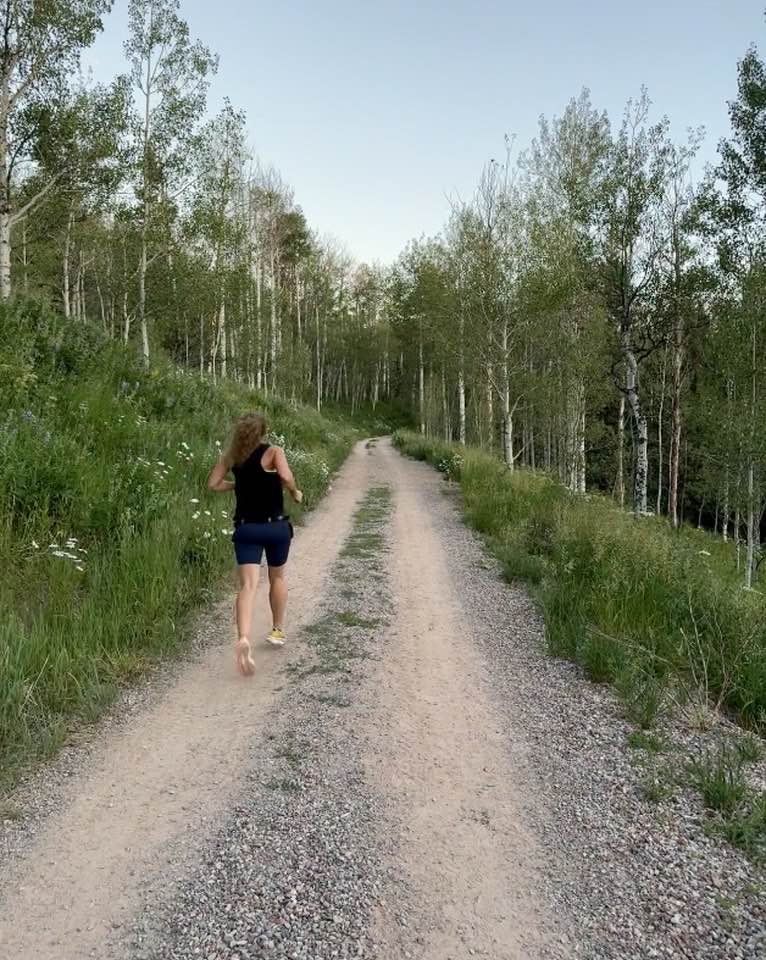
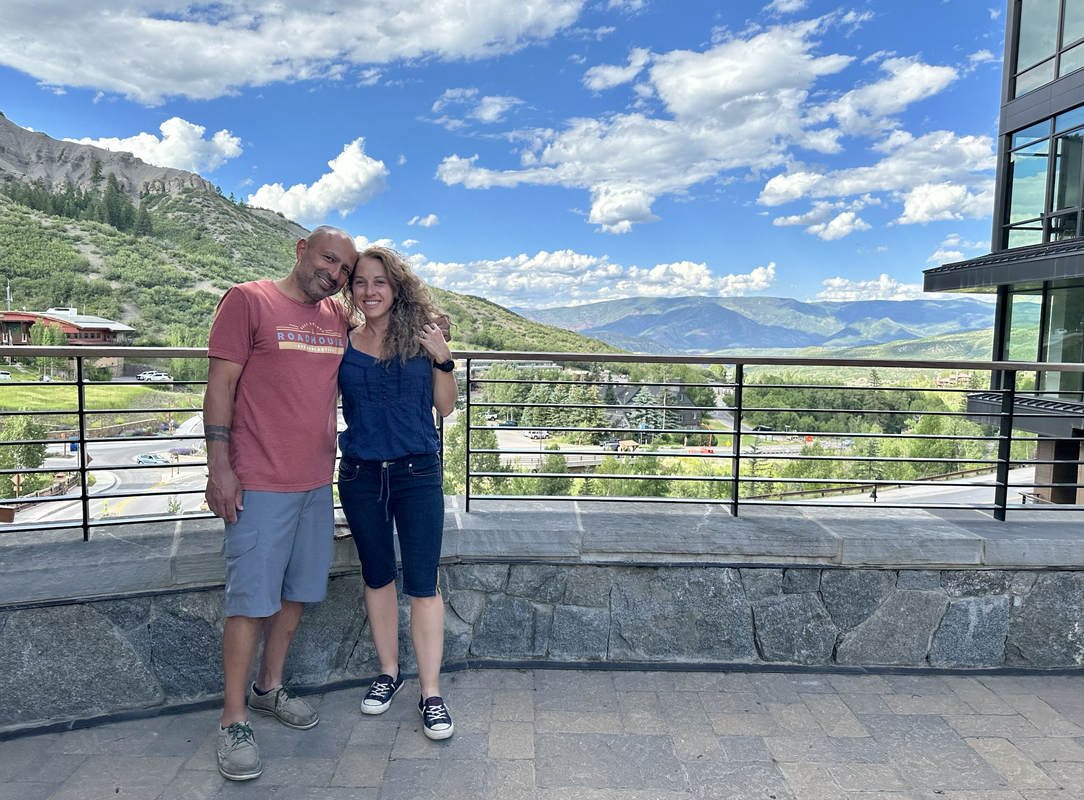
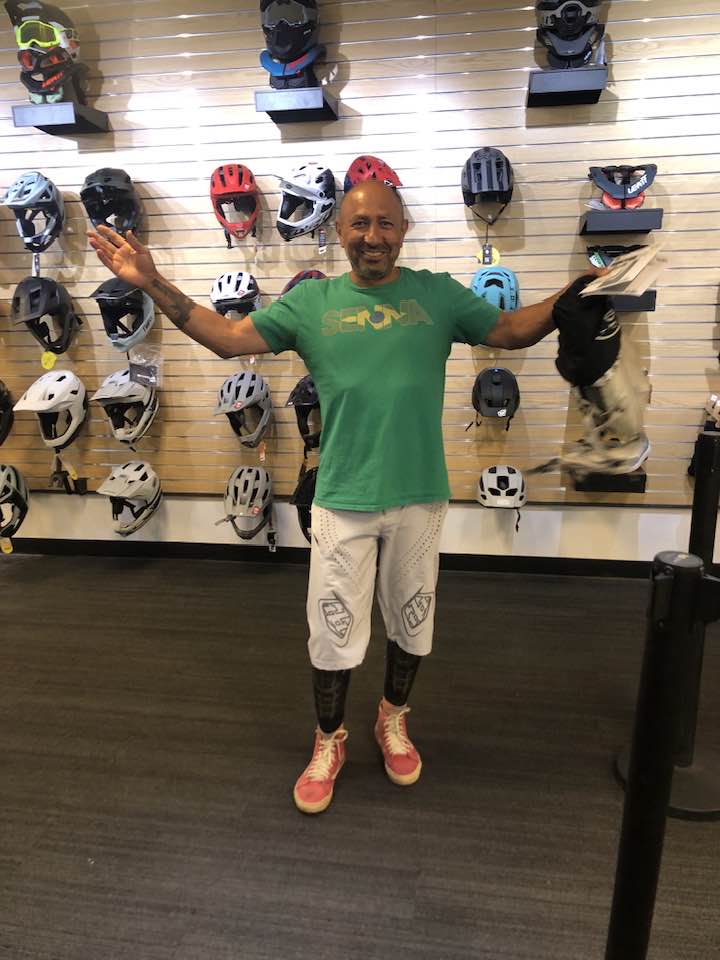
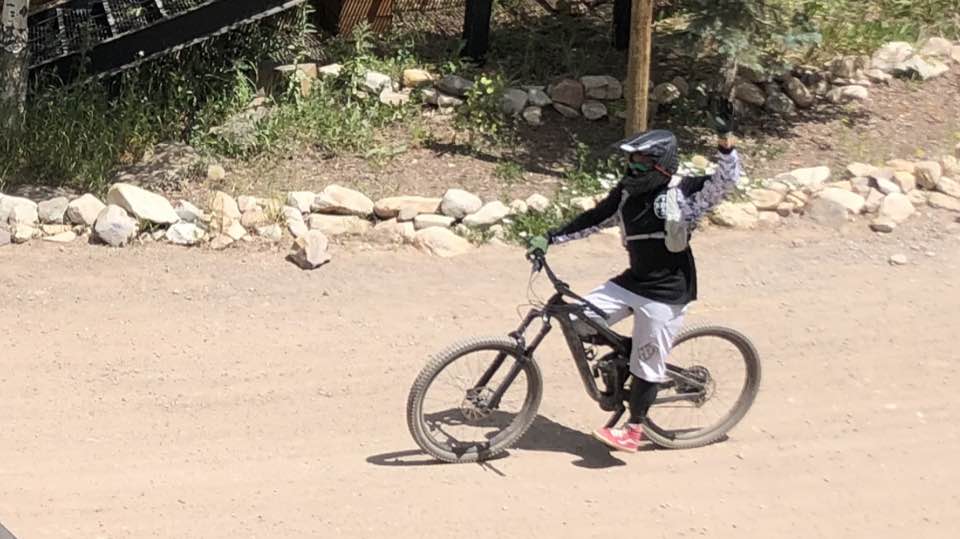
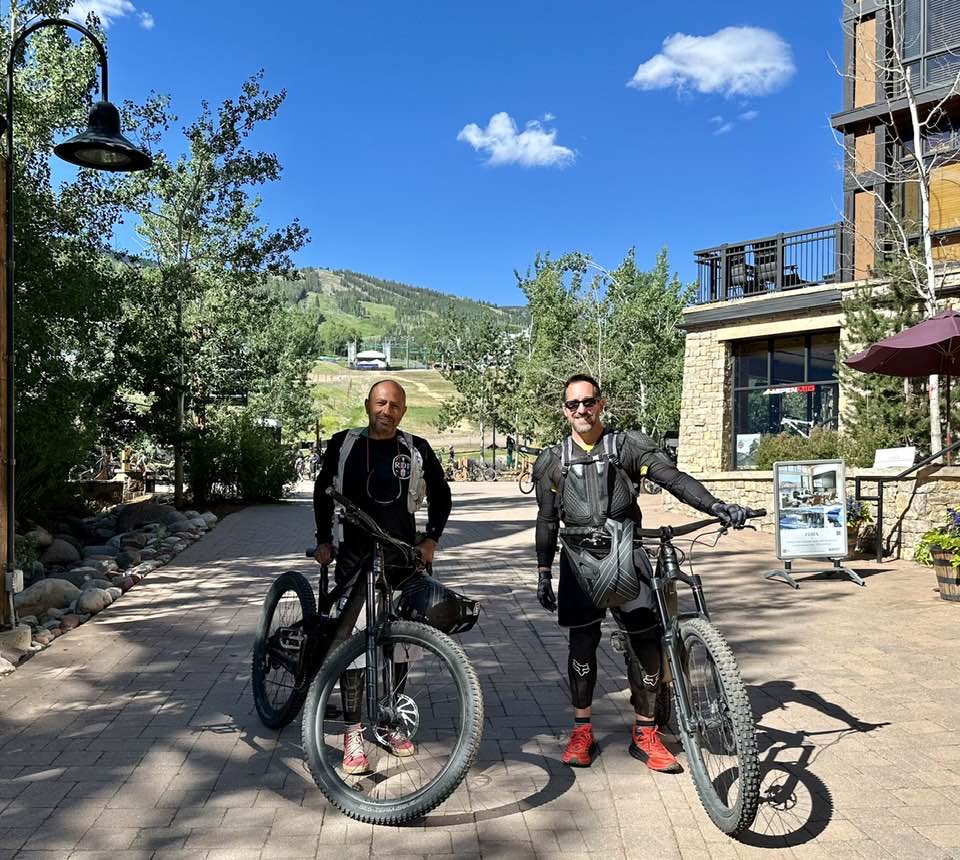
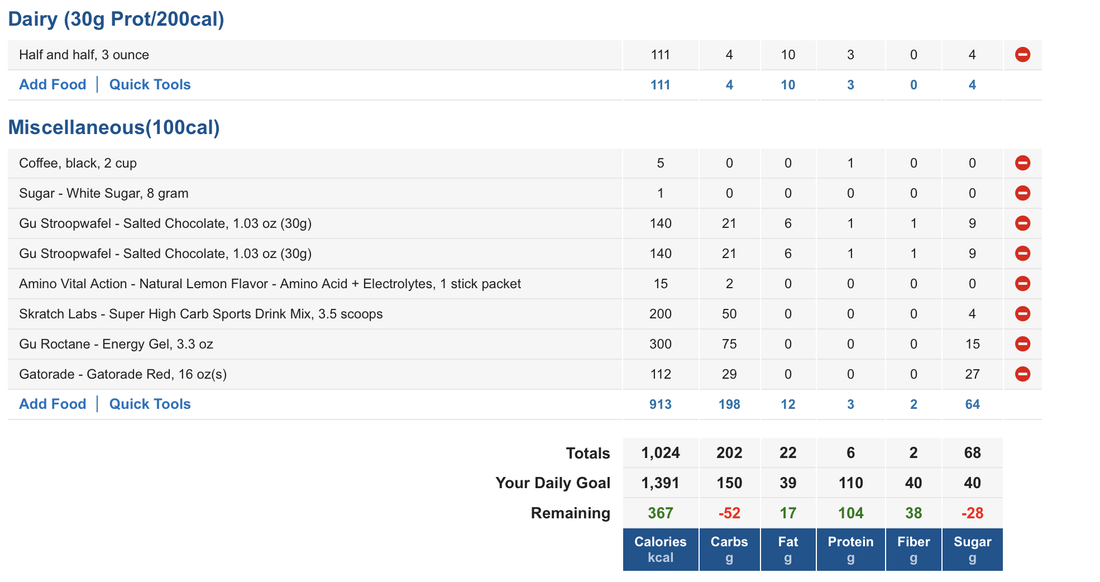
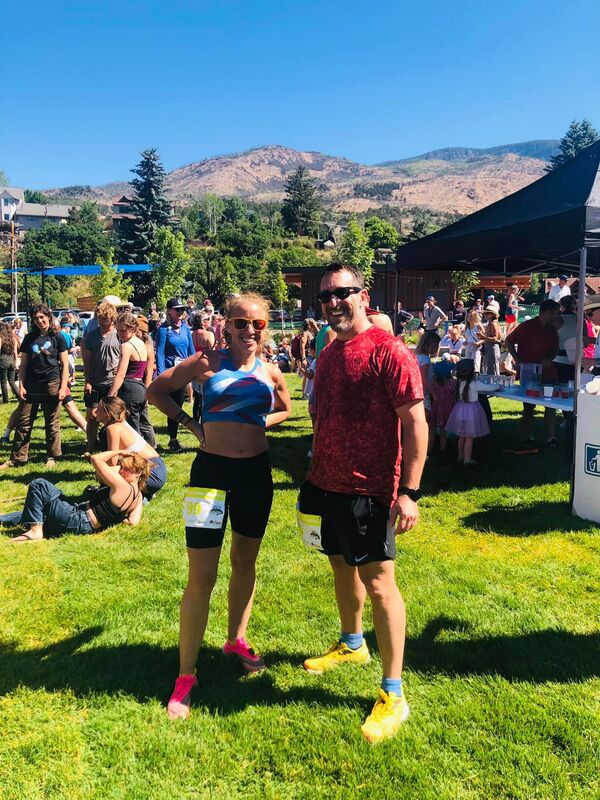
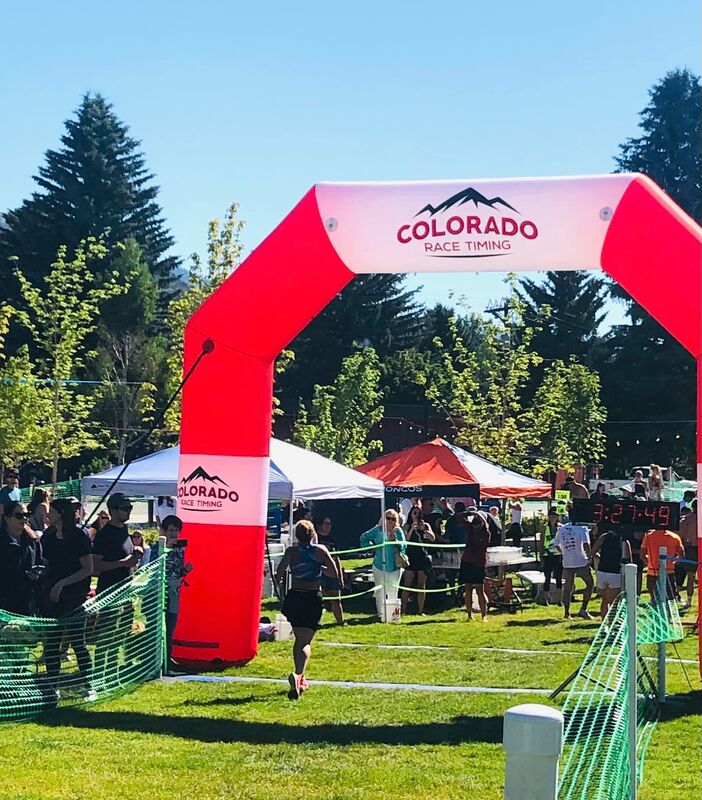
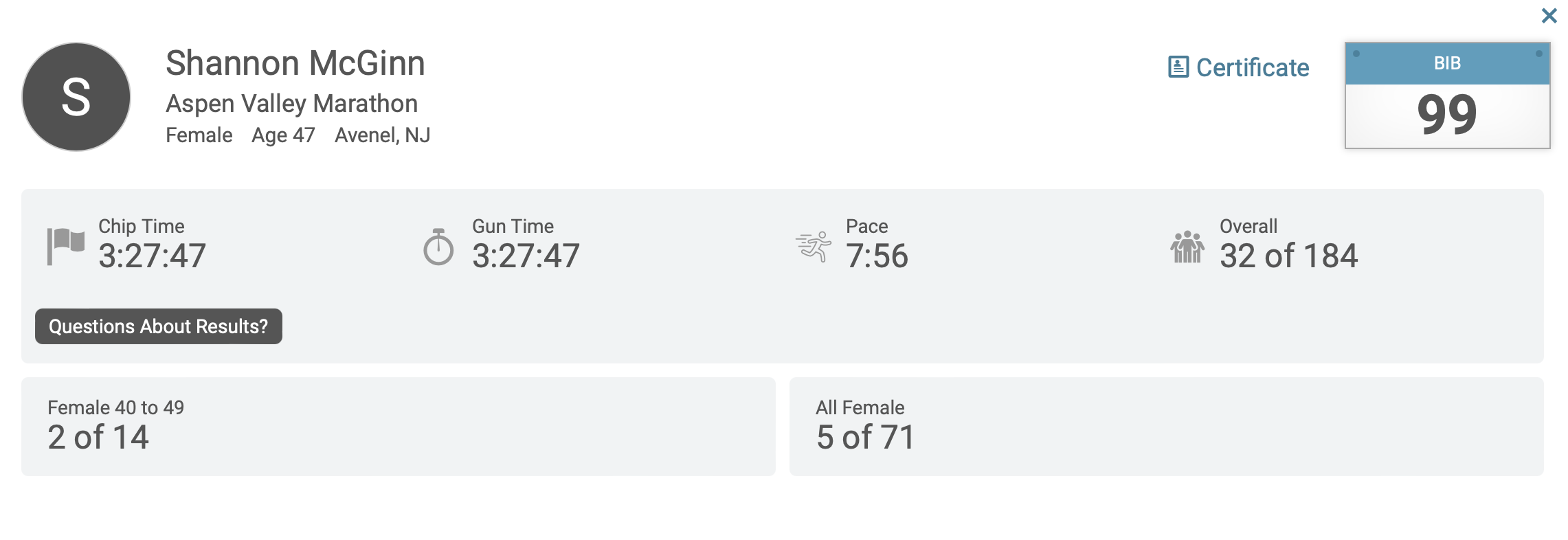
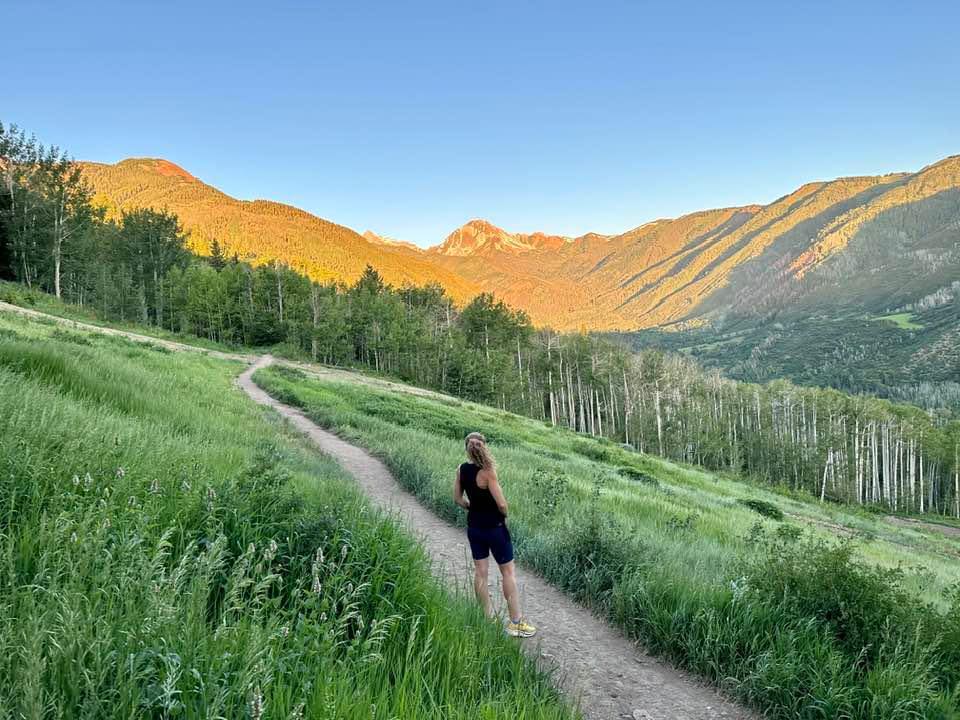
 RSS Feed
RSS Feed